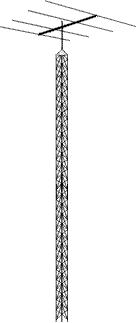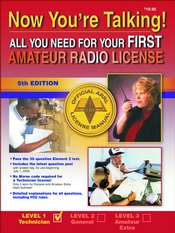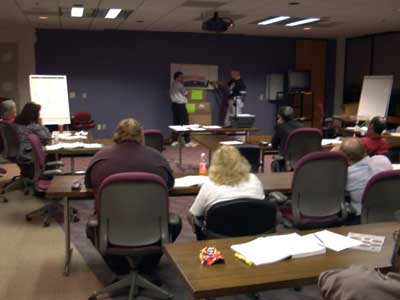 Interested in Amateur Radio?
Interested in Amateur Radio?Great! Ham radio is a wonderful communications hobby and service. It's been around pretty much as long as there's been radio, around the turn of the (last) century. Today, it's state-of-the-art. And it's a terrific compliment to the communications you've started taking for granted on the internet. To get started, you might want some more basic information on Amateur Radio itself. For that, let me point you to a page from our national organization, the American Radio Relay League : http://www.arrl.org/hamradio.html . Don't get lost in browsing and forget to come back! To operate an Amateur Radio station, you need an FCC license. To get that license, you need to learn some rules and regs, some operating procedure, some safety information and some elementary electronics. Then, to show you've learned that stuff, you must pass an exam, administered locally several times a year. That's what our class is all about. There are three levels of ham licenses: Technician, General, and Amateur Extra. As you go up the license ladder, you take progressively more difficult tests, and you earn greater privileges. You can get a simplified overview of the ham license structure here .
The RARS Class The RARS Class is designed to help you pass the FCC exam for the Technician Class license. This is the "No-Code" license, and no Morse code is required. We do offer an optional code class for those interested gaining the extra privileges that come with passing the 5 word-per-minute code test. If you're interested in that, contact Neal Fisher N4HAF . Class Schedule: - student poll! We completed our first "Weekend Warrior" class in early August,
2003. This class concentrated everything into two Saturday sessions,
with an exam following the second session. You can see the schedule
we followed at: www.rars.org/students.
The format was successful - 8 of 11 students passed their test on the
first try - but it was tiring. What should we do for our next class?
Our traditional format has been a six week schedule, with two-hour
classes on Monday and Thursday nights. That seems to take forever,
and many students miss some classes due to conflicts. But we have more
time for expanding the lessons with real-world instruction. The two-Saturday
class format gets it over with, but if you can't make it one of the days,
you probably miss too much. Both classes require homework - studying
the textbook before class. The 6 week class is one chapter per class,
with a couple days (or a weekend) to prepare. The Saturday classes
require studying 5 chapters before the first class, and five more in the
week between classes. So we need your feedback as potential students. What class
format would work best for you? E-mail Gary
Pearce KN4AQ with your preference, and to get on the notification
list for the next class. The Cost: The Book: The Class:
(Click here for more pictures from a recent class.) Location: Exams: There are many other exam opportunities throughout the year, in Raleigh and surrounding communities. Here's a web page for exam info: www.3rdtech.com/nick/hamfaq.htm . The exam fee is $12. The exam fee is not included in the class fee. Class Size Limited - Download the Registration Form: REGISTRATION FORM PDF
will be available for download a few weeks before the class. How Hard Is It? You don't have to be an electrical engineer to get a ham
license. Many hams begin with no technical knowledge beyond what they learned
to get their licenses. The exam questions cover four areas:
The exams are drawn from a pool of multiple-choice questions. The questions, and answers, are public,. They're included in Now You're Talking, or you can download them from this ARRL web site , among others.
We think you're better off actually learning the basics, not just memorizing them. We won't pretend there's no work involved, but it's much less than a high school semester's worth. And most of what you learn will be useful to you as you enjoy the hobby in the future. Test Yourself Online: There are several web sites out there that package the question pool into sample exams. One of our favorites is http://www.aa9pw.com/radio/exam.html . We recommend that you begin taking on-line sample tests starting the first night of class. You probably won't "pass" the first night, but with each class you'll see your score jump up, and by the end of the class you'll pass the test with confidence. The Technician license is code-free, with full privileges on all the VHF, UHF and above ham bands, and that may be as far as you want to go in ham radio for now. But, Morse Code is a strong tradition in Ham Radio, and you'll need to learn it to progress to higher class licenses . Add code to the Tech license and you'll gain voice privileges on the worldwide Ten Meter band, as well as code privileges on several other worldwide bands. The license restructuring in 2000 lowered the code requirements for the General and Amateur Extra licenses to one 5 word-per-minute exam. In 2003, the World Radiocommunication Conference dropped the treaty requirement for code. The FCC has received petitions to eliminate code as a requirement for US amateur radio licensing, so the requirement may be eliminated in the next few years, although Morse code will continue to be a popular on-air mode for the forseeable future. RARS will offers a separate Morse Code class occasionally during the year, separate from the license classes. If you're interested in that, contact Neal Fisher N4HAF . |
|

 Important note: the class lectures and demonstrations
only supplement the text. We answer your questions,
and explain some of the more difficult concepts. We can't teach
everything you need to know in class - there's not enough time.
The truth is that you can get your ham license with the book alone, and
many people do. You can't pass the test with the class
alone, but the class will make it easier, more fun, and you'll know more
real ham radio when you finish! Many people find
that the class provides them structure to actually get it done, get their
license and get on the air.
Important note: the class lectures and demonstrations
only supplement the text. We answer your questions,
and explain some of the more difficult concepts. We can't teach
everything you need to know in class - there's not enough time.
The truth is that you can get your ham license with the book alone, and
many people do. You can't pass the test with the class
alone, but the class will make it easier, more fun, and you'll know more
real ham radio when you finish! Many people find
that the class provides them structure to actually get it done, get their
license and get on the air.